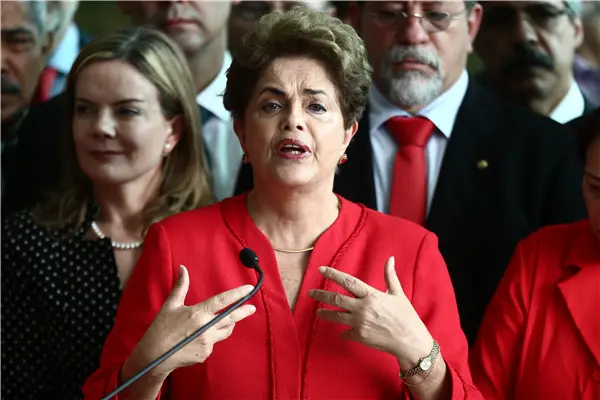Fora Dilma. Dilma Out. The battle cry of the enraged right-wing of Brazil, which rang out around the streets for months, has come to pass. On Wednesday afternoon, the Senate voted to strip Dilma Rousseff of the presidency by 61 votes to 20.
This brings 13 years of leftist rule in Brazil to an end, leaving behind a complex legacy. Under the leadership of Luiz Inacio Lula da Silva (2003-2010), the economy was transformed with the middle-class steadily expanding and the country's foreign debts virtually vanishing. His policies and that of his successor, Rousseff, were marked by broad public spending, through flagship programs such as Bolsa Familia (Family Grant) and Mi Casa, Mi Vida (My House, My Life).
Dilma Rousseff delivers a statement at the Alvorada Palace in Brasilia, Brazil, on Aug. 31, 2016. The Brazilian Senate voted on Wednesday to strip Dilma Rousseff of the presidency by 61 votes in favor to 20 votes against. This means Rousseff is immediately and permanently removed from her role and Michel Temer, who assumed the interim presidency after Rousseff was suspended in May, will become president until the end of this term in 2018. Photo By: Xinhua/Agencia Estado
However, the allegations which led to Rousseff's fall Wednesday began to appear. Allegations of corruption and cronyism marred Lula's terms in office before exploding into the light during the second term of his chosen successor, Rousseff.
The depth of the corruption revealed within Petrobras brought down or raised suspicions about leaders in every corner of Brazilian landscape. Last week, Lula was indicted on charges of corruption and money laundering. Today, Rousseff was brought down.
Yet, the end of this Workers' Party dynasty is unlikely to bring much respite. Operation Lava Jato continues to uncover evidence against leaders.
New President Michel Temer, who will rule until 2018, has been accused of soliciting bribes from a Petrobras subsidiary to fund his allies' political campaigns. His ally, Eduardo Cunha, has resigned as President of the Chamber of Deputies after being accused of holding illegal accounts overseas and soliciting bribes
Within a month of assuming power, three ministers had resigned from his interim government, due to facing corruption or bribery charges of their own.
Despite these challenges, Temer and his Brazilian Democratic Movement Party (PMDB) have tried to portray themselves as the opposite of the Workers' Party.
Photo taken on Aug. 31, 2016 shows a scene of Senate's final impeachment session of Brazil's suspended President Dilma Rousseff in Brasilia, capital of Brazil. Brazilian senate votes to strip Dilma Rousseff of presidency in impeachment trail on Wednesday. Photo By: Xinhua/Li Ming
The government is easing up on business regulations and loosening labor rules instead of favoring unions and tightening environmental laws. State companies such as Petrobras are seeing some of their assets privatized or are being encouraged to team up with the private sector. Markets have responded well to these moves, with investor confidence up. Convincing the Brazilian people may prove far tougher.
However, Temer cannot ignore the part that he played as vice-president to Rousseff. Seen as the manipulator behind Rousseff's impeachment, his poll ratings are not enviable either. A poll in July showed him to have an approval rating of just 14 percent, barely above the 13 percent Rousseff enjoyed prior to her suspension in May.
The rift scarring the Brazilian landscape was laid bare in the Senate during the impeachment vote.
Prior to the vote on Wednesday, one of Rousseff's most fervent supports, Senator Lindbergh Farias, made a final, impassioned plea to save his leader.
Slamming his opponents, he said that there are "those who know there is no crime of responsibility and who vote against impeachment, and the others, who also know there is no crime of responsibility but who vote for impeachment. Those should think of history, of the legacy they leave their children ... this day will be seen as a day of infamy."
Farias vowed to the Brazilian people that "we will never forget this date. A new generation of patriots and democrats will fight to delete this session of the Senate. Senators will end up apologizing to Dilma Rousseff. "
Photo taken on Aug. 31, 2016 shows a screen which displays the result of the vote of the impeachment trail in Brasilia, capital of Brazil.Photo By: Xinhua/Li Ming
The venom was no lesser on the other side. Ronaldo Caiado, a senator from the Democrats, stated that "the Bolivarian populism of the removed Rousseff and her predecessor, Lula, led the country to its situation... with millions of unemployed."
"It is the moment to correctly define the real crooks of the Brazilian politics, crooks who attacked Petrobras, crooks who enriched themselves illegally for public funds ... crooks who left 12 million unemployed," he continued, targeting all public officials involved in sweeping corruption investigations.
While the PMDB senators mostly voted to impeach Rousseff, however, the party made the controversial decision to not support an effort to bar her from public office for eight years. This immediately drew criticisms from other opposition parties after the vote, who said the PMDB had "trampled the Constitution" by not punishing Rousseff to the full extent.
The scenes in the Senate were a microcosm of a Brazil where the lack of trust in politicians and an absence of cooperation threaten to swallow up any new ideas proposed for the government's future.
It falls to Temer to try and mend these woes. On Wednesday evening, he will address the Brazilian people in a pre-recorded speech to begin that process.
Temer clearly has an eye on the future. Mere hours after the vote and his swearing-in, he will already be flying to China for the G20 Summit in Hangzhou on Sept. 4-5, to woo investors and convince partners that Brazil has a steady hand at the helm.
(APD)
 简体中文
简体中文

